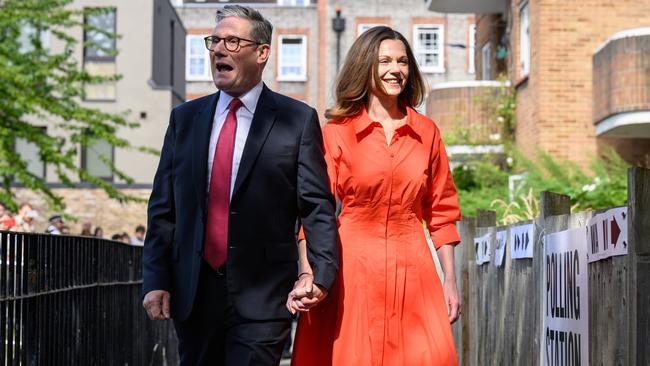Labour leader Keir Starmer given open goal to impose big tax, socialist state after huge victory


These are extraordinary times. Starmer has been ushered into power under the most breathtaking of political landslides, but this is not the exciting times when Tony Blair ousted the Tories with a huge majority in 1997.
Rather, deep inside the Labour heartland there is a wariness about the new prime minister – he has the lowest popularity rating of new all leaders – while on the outside there is a depressing realisation of near certain billion pound tax increases and bewilderment about the state of broken Britain.
Just how Starmer will materialise his magical promises of “growth” is intriguing, although he has hinted that defence is the “bedrock” of the UK economy as well as providing UK security. His manifesto says that fiscal control is non-negotiable and he will apply that mantra to every decision taken by a Labour government. That means having tough spending rules, which doesn’t marry with their promises.
Starmer says he will have a new approach to economic management called “securonomics” of sustainable growth relying on a broad base and having self-sufficient energy and secure supply chains.
On trade Starmer is expected to bring the UK closer to Europe, even at a time when the continent is politically shifting the other way, to the right. How or if this will impact the fledgling free trade deal between Australia and the UK, which came into place in May 2023 won’t be determined any time soon.
Australia’s long standing intelligence co-operation with Britain, alongside the United States, Canada and New Zealand in the Five Eyes alliance has been augmented in recent times with the eye watering AUKUS defence pact and there has been little evidence from the Brits that they are looking to recalibrate that in any way. Indeed Big British companies BAE and Rolls Royce are heavily invested in programs worth many billions, and looking to employ 21,000 people as part of AUKUS.
The Labour-Labor governments at either ends of the world already have interpersonal connections that will help smooth Starmer’s initiation as prime minister.
Anthony Albanese met him when visiting London for King Charles’ coronation last year; and the Australian High Commissioner to the UK, Stephen Smith, has been to the nuclear submarine manufacturing base in Barrow-in-Furness with Starmer to receive briefings about the AUKUS submarine planning.
The huge Labour lead in the polls before the election meant that Starmer has not had to spell out any of his party’s plans to win government. His staid methodical approach was to avoid electoral disaster by saying very little.
But his immediate focus will be intensely domestic to address chronic underfunding in social services, housing, and the skyrocketing cost of living while recommitting to net zero.
That vacuum of detail has left the country blind to biggest changes in the coming months which could include new wealth taxes such as increased capital gains and inheritance tax to pay for greater government spending, significant rental reforms to protect tenants and building on greenfields.
The Conservative Party’s Australian-style “stop the boats” immigration plans, to have offshore processing of boat arrivals in Rwanda, is expected to be scrapped. However Starmer has not fully explained how he will restrict the flood of asylum seekers – 85,000 arrived in 2023 – which costs the country $8bn a year mainly in hotel housing costs.
He has flagged bringing down legal migration levels which stood at 685,000 in 2023, by limiting visas for health care workers and builders and switching to training Britons to do those jobs. Australia’s short-term working visas for under 35’s to Britain are expected to remain unchanged.
Just how beholden Starmer is to Labour’s left flank and whether his party has shaken off the Jeremy Corbyn extremes could quickly emerge in the foreign policy areas of Ukraine, Gaza, and protecting women’s rights.
British voters went to the polls knowing this is going to be a rocky time but punished the Tories for their mismanagement and ineptitude. Starmer is projected as being staid, boring even. Yet everyone has their seat belts tightly fastened for the wildest of political rides.





Keir Starmer’s emphatic triumph has given him, and the British Labour Party, a free rein to impose dramatic remoulding of Britain into a high tax socialist state and Britain’s long and historic relationship with Australia will remain powerful.